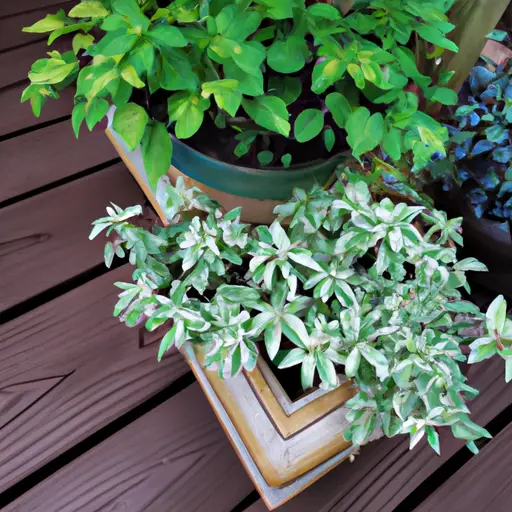Creating a Zen Sanctuary with Serene Container Gardens
In today’s fast-paced world, finding moments of peace and tranquility has become more important than ever. Many people are turning to their outdoor spaces to create a sanctuary where they can find solace and reconnect with nature. One popular way to achieve this is by incorporating serene container gardens into your outdoor oasis. These small, portable gardens not only bring beauty to your space but also provide a sense of harmony and serenity. In this article, we will explore the art of creating a Zen sanctuary with serene container gardens.
What is Zen?
Before we delve into the world of serene container gardens, let’s first understand what Zen means. Zen is a school of Buddhism that emphasizes meditation and mindfulness. It encourages individuals to live in the present moment and find inner peace through self-reflection and contemplation. Zen gardens, also known as Japanese rock gardens or dry landscapes, are physical representations of these teachings. They typically feature simple arrangements of rocks, gravel or sand, moss, and carefully placed plants.
Why Serene Container Gardens?
Container gardening offers several advantages when it comes to creating a Zen sanctuary. First and foremost, containers allow you to control the space you create, regardless of your available area or soil conditions. They are also portable, meaning you can rearrange your garden whenever you desire change or need to adapt to your surroundings.
Additionally, container gardens offer a manageable scale for beginners or those with limited time for maintenance. With small spaces come fewer plant choices, providing an opportunity for intentional selection and focused attention on each plant’s unique qualities.
Choosing the Right Containers
When selecting containers for your serene garden sanctuary, opt for simplicity over complexity. Go for clean lines and natural materials like ceramic pots or wooden boxes that blend seamlessly with nature rather than stealing attention from it. Consider using neutral colors like beige or gray that effortlessly harmonize with any surrounding.
It is essential to select containers that have adequate drainage to prevent waterlogged roots and promote healthy plant growth. Alternatively, you can choose self-watering containers that will provide plants with the necessary moisture without excessive maintenance.
Selecting Plants for Serenity
Choosing the right plants is crucial for creating a serene container garden. Focus on plants with calming qualities and those that enhance your sensory experience. Here are a few types of plants that can contribute to a Zen sanctuary:
1. Bamboo: Known for its grace and elegance, bamboo brings a sense of tranquility to any space. Opt for clumping bamboo varieties that don’t spread aggressively.
2. Japanese Maple: These stunning trees are famous for their delicate leaves and vibrant colors. Plant them in larger containers to serve as focal points in your garden.
3. Moss: Encourage the growth of moss in your container garden as it adds an element of natural beauty and serenity.
4. Ornamental Grasses: Choose ornamental grasses like bamboo grass or feather reed grass, which gently sway with the breeze and create soothing sounds.
5. Evergreen Shrubs: Evergreen shrubs such as boxwoods or dwarf conifers provide year-round greenery, adding structure and consistency to your garden design.
6. Lavender: Known for its calming properties, lavender not only smells divine but also attracts beneficial pollinators such as bees and butterflies.
Design Principles
To achieve a balanced Zen sanctuary with your serene container gardens, apply these design principles:
1. Minimalism: Keep it simple by using only a few carefully selected plants arranged in clean lines or geometric patterns within your containers.
2. Balance: Create balance by arranging containers in pairs or groups of odd numbers rather than scattering them randomly throughout your space.
3. Scale & Proportion: Ensure that your container size matches the scale of your surroundings while considering the mature size of each plant.
4. Negative Space: Embrace empty spaces within your container arrangements. Negative space allows your eye to rest and appreciate the beauty of each plant.
5. Elemental Harmony: Incorporate elements like rocks, stones, or gravel to mimic the natural landscape and create a sense of unity within your container gardens.
Maintenance and Care
To maintain the serenity of your container garden sanctuary, regular upkeep is necessary. Here are a few maintenance tasks to keep in mind:
1. Watering: Ensure that your containers receive adequate water without overwatering. Check soil moisture levels regularly and adjust watering accordingly.
2. Pruning: Regularly trim your plants to maintain their shape and prevent overcrowding or leaf loss.
3. Fertilizing: Provide plants with essential nutrients by fertilizing them at appropriate intervals to promote healthy growth.
4. Weeding: Keep an eye out for weeds that can disrupt the tranquility of your container gardens and remove them promptly.
Final Thoughts
Creating a Zen sanctuary with serene container gardens is a rewarding endeavor that allows you to cultivate peace and tranquility in your outdoor space. By carefully selecting plants, choosing suitable containers, applying design principles, and maintaining the garden with care, you can create an oasis where you can find solace amidst the chaos of everyday life. So, grab your gardening tools and start creating your own serene container garden sanctuary today!













